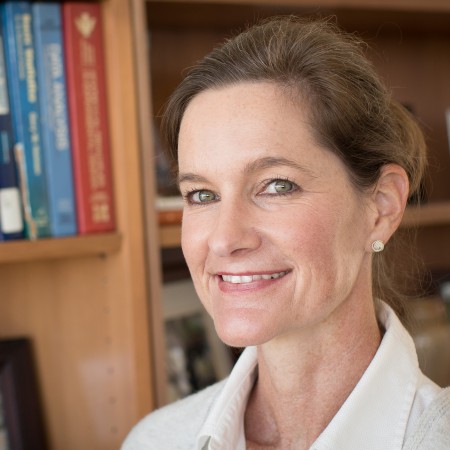
Christa McIntyre
Research Interests: Neural mechanisms of stress effects on memory and extinction of conditioned fear
Professional Preparation
The University of California, Irvine - 2006
University of Virginia - 2000
American University - 1994
Research Areas
Research Interests
Information acquired during daily encounters is not readily encoded into memory, but requires some effort or rehearsal to be preserved. In contrast, experiences that are either arousing or emotionally meaningful in content appear to be permanently stored into memory without conscious effort. My research is aimed at understanding the effect of emotional arousal on memory storage. Research findings to date indicate that events that are sufficiently arousing to be remembered for the long-term lead to activation of the amygdala. This amygdala activation may, in turn, initiate long-term memory storage by influencing synaptic strength in other areas of the brain, such as the hippocampus and cortex. I am currently using in vivo microdialysis, western blots, immunohistochemstry and in situ hybridization to better understand how emotion-induced amygdala activity may modulate the expression of synaptic proteins in areas that underlie memory storage.
This research is aimed at gaining information regarding the neuronal signals that determine whether a memory will be stored for the long term and may shed some light on the precise mechanisms involved in the synaptic changes that underlie memory. Such knowledge may ultimately be used to benefit individuals suffering from various memory disorders including Alzheimers disease and post traumatic stress disorder.
Publications
Awards
Appointments
The University of Texas at Dallas [2013–Present]
The University of Texas at Dallas [2016–2017]
The University of Texas at Dallas [2014–2016]
The University of Texas at Dallas [2006–2013]
Chapman University, Orange, CA [2005–2005]
Science Right: www.writescienceright.com [2003–2006]
University of California, Irvine, Irvine, CA [1999–2006]
University of Virginia, Charlottesville, VA [1994–1998]
University of Virginia, Charlottesville, VA [1994–1999]
Additional Information
Patents
Title: Timing Control for Paired PlasticityInventors: Michael Kilgard, Lawrence Cauller, Navzer Engineer, Christa McIntyre, and Will RoselliniIssued date: 7/16/13 Title: Methods for Enhancing Exposure Therapy using Vagus Nerve StimulationInventors: Christa McIntyre, Navzer Engineer, and Michael KilgardIssued date: 7/28/15 Title: Systems, Methods, and Devices for Paired PlasticityInventors: Lawrence Cauller, Michael Kilgard, Navzer Engineer, Christa McIntyre, and Will RoselliniIssued date: 7/28/15Service
Panelist and ad-hoc grant reviewer for: National Institute of Mental Health (NIMH)Member of Biobehavioral Regulation Learning and Ethology (BRLE) study section (2017-present)
Panelist Learning and Memory (LAM) study section (2012-2016)
Panelist Pathophysiological Basis of Mental Disorders and Addiction (PMDA) study section (2015-2016)
National Institutes of Health, other institutes
Ad-hoc member of National Institute of Aging (2012)
Panelist NIH BRAIN Special Emphasis Panel (2016)
Panelist NIH Acute Neural Injury and Epilepsy (2016)
Veterans Administration (VA)
Panelist Mental Health and Behavioral Sciences (2020)
Panelist Small Projects in Rehabilitation Research (2021)
National Science Foundation (NSF) Panelist October 2009 (Arlington, VA) October 2011 (Arlington, VA) Ad hoc reviewer (December 2013) Human Frontiers Science Program (HFSP) Mail Reviewer (2011)
Professional memberships
- Society for Neuroscience (1995-present)
- Cellular and Molecular Cognition Society (2007-present)
- Pavlovian Society (2018-present)
News Articles
Professor of Neuroscience Applauded By Peers, Students
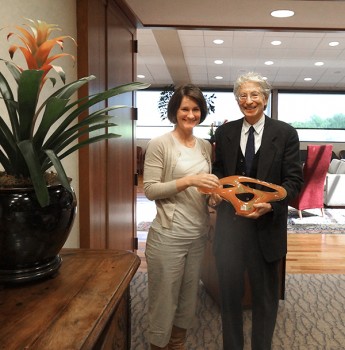 Dr. Christa McIntyre-Rodriguez, an assistant professor of neuroscience, recently received the Aage Møller Teaching Award. "The award honors outstanding teaching, mentoring and supervision. Christa McIntyre-Rodriguez exemplifies these qualities,” said Dr. Bert Moore, dean of the School of Behavioral and Brain Sciences and the Aage and Margareta Møller Distinguished Professor. “She is a gifted instructor and mentor known by her students and colleagues alike for her dedication to student training.” Faculty are nominated for the award by anonymous student evaluations and peer recommendations. Students in McIntyre-Rodriguez’s neuroscience laboratory methods class described her as a role model, particularly for female neuroscience students. “Dr. McIntyre-Rodriguez is simply awesome,” said one student. “I loved the debates and discussions, and her civil and encouraging reactions to whatever anyone said. We all felt appreciated.”
Dr. Christa McIntyre-Rodriguez, an assistant professor of neuroscience, recently received the Aage Møller Teaching Award. "The award honors outstanding teaching, mentoring and supervision. Christa McIntyre-Rodriguez exemplifies these qualities,” said Dr. Bert Moore, dean of the School of Behavioral and Brain Sciences and the Aage and Margareta Møller Distinguished Professor. “She is a gifted instructor and mentor known by her students and colleagues alike for her dedication to student training.” Faculty are nominated for the award by anonymous student evaluations and peer recommendations. Students in McIntyre-Rodriguez’s neuroscience laboratory methods class described her as a role model, particularly for female neuroscience students. “Dr. McIntyre-Rodriguez is simply awesome,” said one student. “I loved the debates and discussions, and her civil and encouraging reactions to whatever anyone said. We all felt appreciated.”
Study: Vagus Nerve Stimulation Shows Progress Against PTSD Symptoms
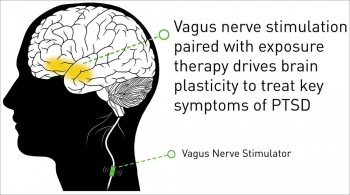 Researchers at The University of Texas at Dallas are exploring how mild stimulation of the vagus nerve could help alleviate symptoms of post-traumatic stress disorder (PTSD), a complex condition that can cause debilitating anxiety and mental anguish.
Researchers at The University of Texas at Dallas are exploring how mild stimulation of the vagus nerve could help alleviate symptoms of post-traumatic stress disorder (PTSD), a complex condition that can cause debilitating anxiety and mental anguish. The vagus nerve controls the parasympathetic nervous system, which oversees a vast array of crucial bodily functions including digestion and slowing the heart rate. Vagus nerve stimulation (VNS) is already used as a treatment for disorders including epilepsy and depression, and it has been shown to enhance memory retention.
National Funding Will Support Research on Treatment for Anxiety
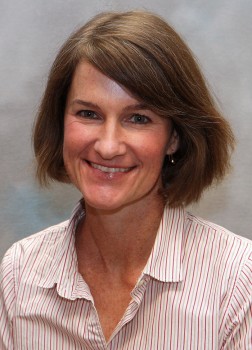 Two professors in the School of Behavioral and Brain Sciences recently received national funding to study the mechanisms behind a proposed new treatment for anxiety disorders.
Two professors in the School of Behavioral and Brain Sciences recently received national funding to study the mechanisms behind a proposed new treatment for anxiety disorders.The National Institute of Mental Health grant will provide $423,000 over the next three years to Dr. Christa McIntyre-Rodriguez and Dr. Sven Kroener to fund their research.
“This grant will enable us to address unresolved questions,” said McIntyre-Rodriguez, principal investigator on the grant. “Previously, we found a method to enhance learning that a formerly dangerous situation is no longer dangerous.
Halloween Frights Can Have Scary Good Benefits, Neuroscientist Says
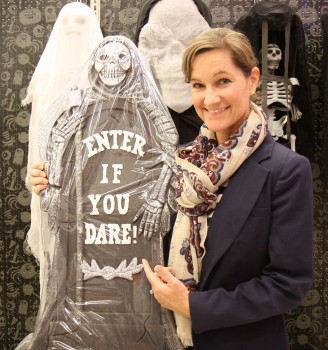 Halloween often is marked with scary movies, gory costumes and haunted houses. According to a UT Dallas researcher, such events provide an outlet for the release of pent-up fears while at the same time helping individuals feel stronger and sharper.
Halloween often is marked with scary movies, gory costumes and haunted houses. According to a UT Dallas researcher, such events provide an outlet for the release of pent-up fears while at the same time helping individuals feel stronger and sharper.Dr. Christa McIntyre, associate professor of neuroscience in the School of Behavioral and Brain Sciences, said fear can help people stay away from danger, but its neurological effect can attract people, as well.
“Some people intentionally put themselves into situations where they will experience fear, such as haunted houses, horror movies and roller coasters,” McIntyre said.
Dr. Christa McIntyre Rodriguez Awarded Nearly $500,000 From NIH
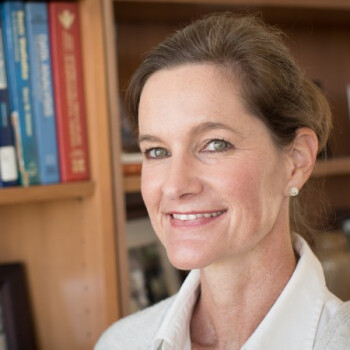 Dr. Christa McIntyre Rodriguez received $498,116 from the the National Institutes of Health (NIH) for her research on Vagus Nerve Stimulation Targets Fear Pathways to Enhance Extinction of Conditioned Fear. Dr. McIntyre-Rodriguez uses exposure-based therapies to get rid of conditioned fears through repeated, unreinforced exposures to reminders of traumatic events. Her development of an effective adjunctive therapy aims to improve the tolerability of therapy for patients as well as help consolidate and maintain the extinction memory.
Dr. Christa McIntyre Rodriguez received $498,116 from the the National Institutes of Health (NIH) for her research on Vagus Nerve Stimulation Targets Fear Pathways to Enhance Extinction of Conditioned Fear. Dr. McIntyre-Rodriguez uses exposure-based therapies to get rid of conditioned fears through repeated, unreinforced exposures to reminders of traumatic events. Her development of an effective adjunctive therapy aims to improve the tolerability of therapy for patients as well as help consolidate and maintain the extinction memory.